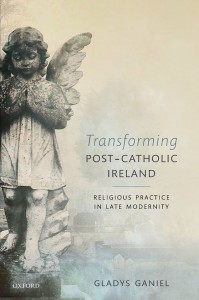 Yesterday I was interviewed on Newstalk FM about my latest book, Transforming Post-Catholic Ireland: Religious Practice in Late Modernity.
Yesterday I was interviewed on Newstalk FM about my latest book, Transforming Post-Catholic Ireland: Religious Practice in Late Modernity.
You can listen to the full interview (about 12 minutes) below, where host Sean Moncrieff asks some wide-ranging questions.
I explain what I mean by post-Catholic, characterising it as a shift in consciousness in which the Catholic Church as an institution is no longer held in high esteem by most of the population. Now people often define their own faith in opposition to Catholicism, even if they still call themselves as Catholic.
I talk about how some people want to retain a relationship with the institutional church, giving examples from the book of how people are creating spaces outside of the institutional church where they can find a more meaningful spirituality. One such example was Slí Éile, a Jesuit ministry for young adults, where under 35’s told me they experienced a deeper spirituality, a sense of community, and a focus on social justice that was more meaningful for them than the run-of-the-mill parish life.
I speak further about how people’s relationship with the institutional church varies. Another case study in the book is the parish pastoral council in Ballyboden, Dublin – so those people are very much involved in their parish and embedded in the institutional church. Yet they still make the distinction between their local priest, who they appreciate and respect; and the bishops and the Vatican. One woman there even said to me: ‘the bishops, have they even read the same gospels that I’ve read?’ At the same time, some of the young people in Sli Eile didn’t go to mass in their own parish anymore.
I said that one of the most striking things I found was that people just couldn’t stop talking about Catholicism. Originally the research project wasn’t going to focus so much on the Catholic Church – it was focused on immigration/diversity, ecumenism, and reconciliation. But without even asking people about the Catholic Church, they started talking about it. Some interviews were like therapy sessions, as if people needed to process what it was like living as a Catholic on an island where the role and standing of the Catholic Church has changed so rapidly.
At the end of the interview I said that we are moving towards a pattern of more lay involvement, with lay people being empowered to shape the future direction of their church. Moncrieff asked if that was moving towards a more ‘Protestant’ model?
I noted that there has been a move in the past generation for people on the island from all denominations to see each other more as fellow Christians than as different ‘religions’, and expressed my hope that if Catholics begin to be as involved in church governance as some of their Protestant fellow Christians, this might further improve community relations.
You can read the first chapter of my book for free on the Oxford University Press website. (Click on ‘sample material’)
“I said that one of the most striking things I found was that people just couldn’t stop talking about Catholicism. Originally the research project wasn’t going to focus so much on the Catholic Church – it was focused on immigration/diversity, ecumenism, and reconciliation. But without even asking people about the Catholic Church, they started talking about it. Some interviews were like therapy sessions, as if people needed to process what it was like living as a Catholic on an island where the role and standing of the Catholic Church has changed so rapidly.”
The reason for this has been the almost total lack of any formal forum within Catholic Church structures for lay people to discuss or debate matters of church and faith. Of late there have been a few diocesan one-off ‘listening exercises’ but they do not have any power to influence decision making in any meaningful way (Canon law bars lay people from meaningful decision making). Pastoral Councils are consultative only and interestingly are never given the opportunity to come together at diocesan or national level to develop and offer a collective voice. Canon law does allow for synodality but this is never used (Limerick being a recent exception).
This neglect has prompted at least some committed Catholics to find their voice in Catholic reform groups which at least allow them to air their thoughts and views online. Unfortunately they struggle to get their voice heard or to be taken seriously. They face many obstacles. On the one hand there is conservatism and indifference. On the other is the fact that the many Catholics who may have shared their views, have either lost hope that change can happen or do else no longer wishing to be identified with the institution, have voted with their feet and abandoned church practice.
However, it would seem that the need to converse on matters of church and faith remains strong and every opportunity to do so will still be taken up, be that with a passing research academic or I guess over pints in public houses across Ireland any night of the week.